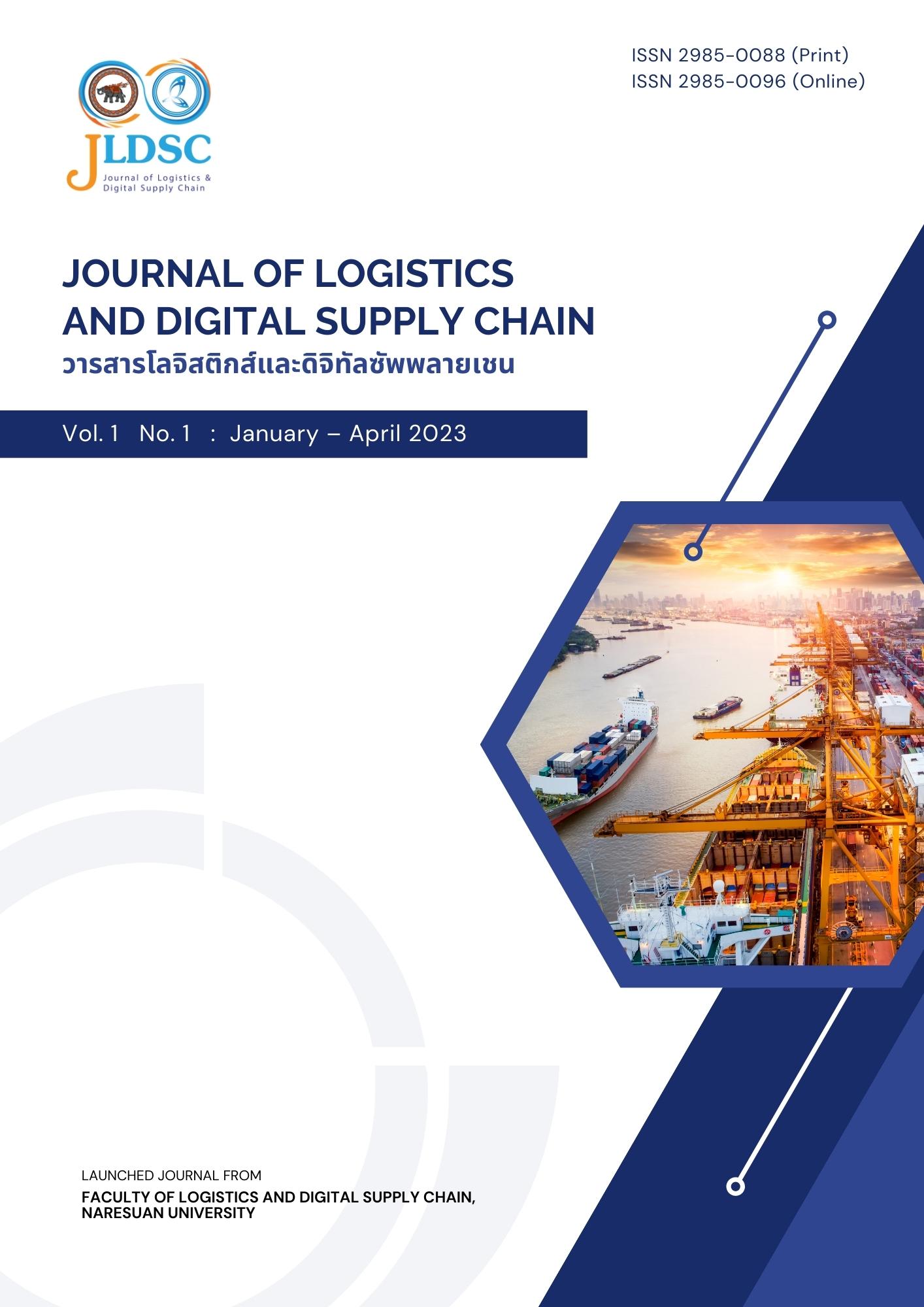Humanitarian Logistics and Supply Chain Management Performance, Development of A Theoretical Framework
Main Article Content
บทคัดย่อ
This study investigate and construct a performance measurement framework for Humanitarian Logistics and Supply Chain Management (HLSCM). By utilizing the secondary data a qualitative methodology has been applied and has identified the critical factors which counted most in the HLSCM performance e.g. block chain technology, transparency, public trust, coordination and traceability. A qualitative research design was employed, and 12 articles on supply chain management and humanitarian logistics were analyzed using relevant resources such as “Google Scholar”, “JSTOR”, and “Scopus” for literature search. The findings of this study will be useful for the HLSCM scholars, humanitarian organizations, and public and private organizations and service providers. Additionally, the rapidly shifting settings and situations demand that all stakeholders shall collaborate effectively either the situation is disasters’ or normal. This research contributes significantly and effectively to the body of knowledge on humanitarian logistics and supply chain supply and it is a strong contender to spread the word about swift, equitable, and secure humanitarian logistics to identify knowledge gaps and to open doors for future studies. The theoretical framework developed in this study provides a useful guide for future research on this topic, highlighting the importance of transparency, public trust, coordination, and traceability in enhancing the effectiveness of humanitarian logistics.
Article Details

อนุญาตภายใต้เงื่อนไข Creative Commons Attribution-NonCommercial-NoDerivatives 4.0 International License.
เอกสารอ้างอิง
Aranda, D. A., Fernández, L. M. M., & Stantchev, V. (2019). Integration of Internet of Things (IoT) and Blockchain to increase humanitarian aid supply chains performance. 2019 5th International Conference on Transportation Information and Safety (ICTIS) (pp. 140-145). Liverpool, UK : IEEE.
Baharmand, H., Maghsoudi, A., & Coppi, G. (2021). Exploring the application of blockchain to humanitarian supply chains: insights from Humanitarian Supply Blockchain pilot project. International Journal of Operations & Production Management, 41 (9), 1522-1543.
Centobelli, P., Cerchione, R., Del Vecchio, P., Oropallo, E., & Secundo, G. (2022). Blockchain technology for bridging trust, traceability and transparency in circular supply chain. Information & Management, 59(7), 103508.
Dubey, R., Gunasekaran, A., Bryde, D. J., Dwivedi, Y. K., & Papadopoulos, T. (2020). Blockchain technology for enhancing swift-trust, collaboration and resilience within a humanitarian supply chain setting. International journal of Production research, 58(11), 3381-3398.
Dubey, R., Gunasekaran, A., Childe, S. J., Roubaud, D., Wamba, S. F., Giannakis, M., & Foropon, C. (2019). Big data analytics and organizational culture as complements to swift trust and collaborative performance in the humanitarian supply chain. International Journal of Production Economics, 210, 120-136.
Dubey, R., Singh, T., & Gupta, O. K. (2015). Impact of agility, adaptability and alignment on humanitarian logistics performance: mediating effect of leadership. Global Business Review, 16(5), 812-831.
Garcia-Torres, S., Rey-Garcia, M., Sáenz, J., & Seuring, S. (2021). Traceability and transparency for sustainable fashion-apparel supply chains. Journal of Fashion Marketing and Management: An International Journal, 26(2), 344-364.
Gonzalez-Feliu, J., Hasnaoui, A., Morana, J., & Rueda, F. (2021). Digitalization, traceability and Supply Chain Performance in social improvement logistics: the case of Bienestarina distribution, Colombia Prolog 2021. France : Nantes,.
Khan, M., Imtiaz, S., Parvaiz, G. S., Hussain, A., & Bae, J. (2021). Integration of internet-of-things with blockchain technology to enhance humanitarian logistics performance. IEEE Access (pp. 25422-25436).
Mann, S., Potdar, V., Gajavilli, R. S., & Chandan, A. (2018). Blockchain technology for supply chain traceability, transparency and data provenance. Proceedings of the 2018 international conference on blockchain technology and application (pp. 22 - 26). New York USA : Association for Computing Machinery.
Masudin, I., Lau, E., Safitri, N. T., Restuputri, D. P., & Handayani, D. I. (2021). The impact of the traceability of the information systems on humanitarian logistics performance: Case study of Indonesian relief logistics services. Cogent Business & Management, 8(1), 1906052.
Yacoub, G., & Castillo, M. (2021). Blockchain in your grocery basket: trust and traceability as a strategy. Journal of Business Strategy, 43(4), 247-256.


